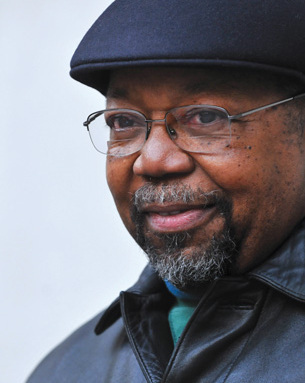 loading
loading
Where They Are NowNew shepherd in town Post-Standard/Lauren LongGeoffrey Black ’72MAR is the new president of the United Church of Christ—the church of Yale's founders. View full imageIn June, Geoffrey Black ’72MAR became the first African American to be elected general minister and president of the 1.1 million-member United Church of Christ. Descended from the Congregational churches of Puritan New England, the UCC is one of the most socially and theologically liberal Christian denominations in the country. Black has worked in campus ministry, in congregations on Long Island, and in the administration of the national UCC. Most recently, he was minister of the church's New York Conference for nine years. Y: Your Christian name is pronounced “JOFF-ree.” Where did that come from? B: My mother always pronounced my name Joffrey, although no one else in the family did. Eventually, when I became my own person, I decided to pronounce it the way my mother did. Y: You've said the message of the UCC is that “it is possible to be an inclusive church and still be the church.” Why do you think inclusivity and “church” are sometimes in opposition? B: In the world of church there are still many places where the kind of inclusivity we espouse -- and we haven't achieved it yet, I want to make that clear -- is not accepted. Embracing people who are same-gender loving as whole, valid members of the Christian church entitled to positions of leadership and responsibility -- that's not an acceptable stance in many communions. But the church in its fullness is radically inclusive. Y: And race? B: I still think race is a factor in terms of inclusivity. For instance, many couples are not welcomed everyplace if they are interracial. If churches can't get over that, we are placing an impediment to reaching people with the Gospel. Y: The UCC is proud of its “open and affirming” stance, and yet many African American churches have had trouble accepting members of the LGBT community into their congregations. Will you use your position to encourage black churches to be more welcoming? B: Yes. Within the last five years, there have been two major events called The Black Church in Crisis. Our national staff and some national African American organizations brought together a considerable number of pastors in particular to talk about issues of inclusivity. I hope we can use similar events to foster more dialogue and more openness around this issue for all of our churches. And I think the other issue, quite frankly, is women in ministry. African American women rarely find those opportunities in the UCC. And it's particularly painful to me that more African American women do not find opportunities to serve in African American congregations. Y: What did you think of the UCC's famous ad that depicted bouncers keeping people out of a church? B: The bouncer ad was a good ad. We were trying to get at a younger demographic, people who went to nightclubs and had the experience of getting turned away by bouncers. Those people could relate to the fact that not all churches would turn them away because of the way they dressed or because of their tattoos or their sexual orientation. Y: Some say those ads contributed to an ugly antagonism that has grown between conservative, largely evangelical, Protestants and liberal, largely mainline, Protestants. Is there a way to broker peace in America's Christian trenches? B: I hope there is peace now. Because we are at odds on some things does not mean we can't work together on those things we do agree on. There's no reason evangelical and progressive churches can't see themselves as partners in feeding the hungry or liberating the poor from poverty. Y: How do you feel Christianity should combat the rise of the so-called new atheism? B: The attraction of atheism has existed since the Enlightenment, and some people are always going to embrace that philosophy. That's not going to go away, and it's not something we need to combat. We need to be authentically who we are, and engaged in the world as progressives espousing a worldview that doesn't abandon intellect. Intellect is a gift of God. Y: The UCC has a slogan, “God is still speaking.” What does God's voice sound like? B: You asked about scripture earlier. That “still small voice” (1 Kings 19:12) is another scripture I find myself quoting often. The voice of God. The voice of God may be silent. The voice of God may be a child who reminds you what an untainted belief in God is about. The voice of God might be expressed in a loved one who comes to you with a sincere thought of affirmation of faith. I'm one who's listening for the voice of God in every conversation. I listen for it in books I read, and in music I hear. Y: You were an assistant chaplain at Brown. So, in whom do you have more faith -- Bulldogs or Bears? B: [Laughs] That's hard . . . I didn't go to Yale for undergrad. I went to a school [Lincoln University] without a football team. I'm not much of a football fan. But I am a fan of Bulldogs and Bears in the last quarter of any Ivy League championship game.
The comment period has expired.
|
|